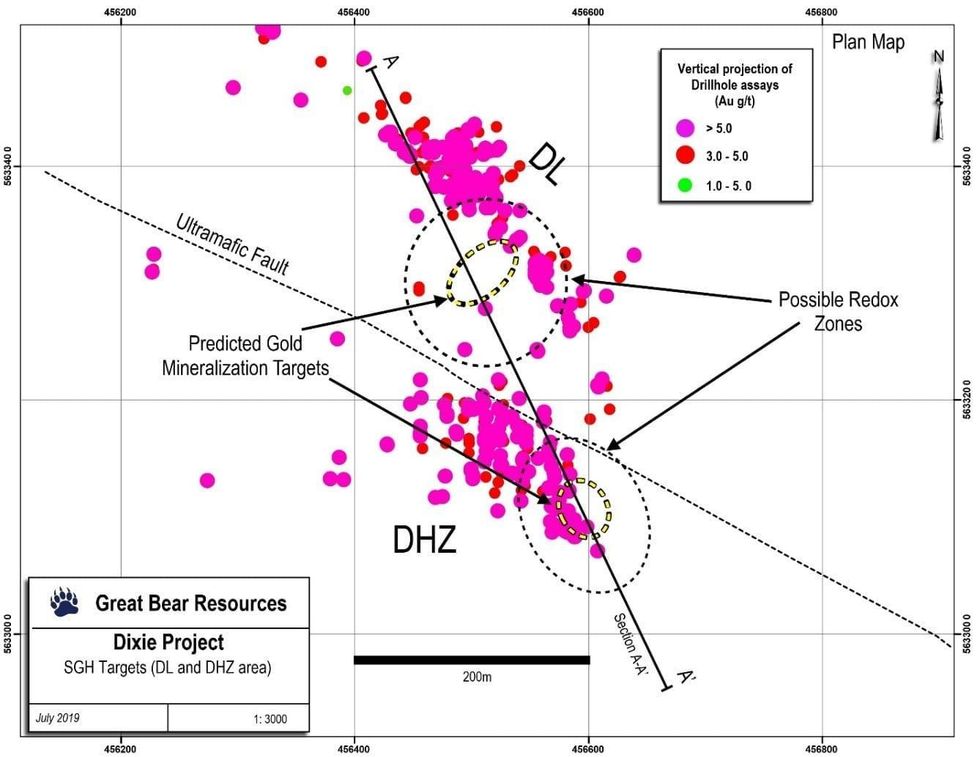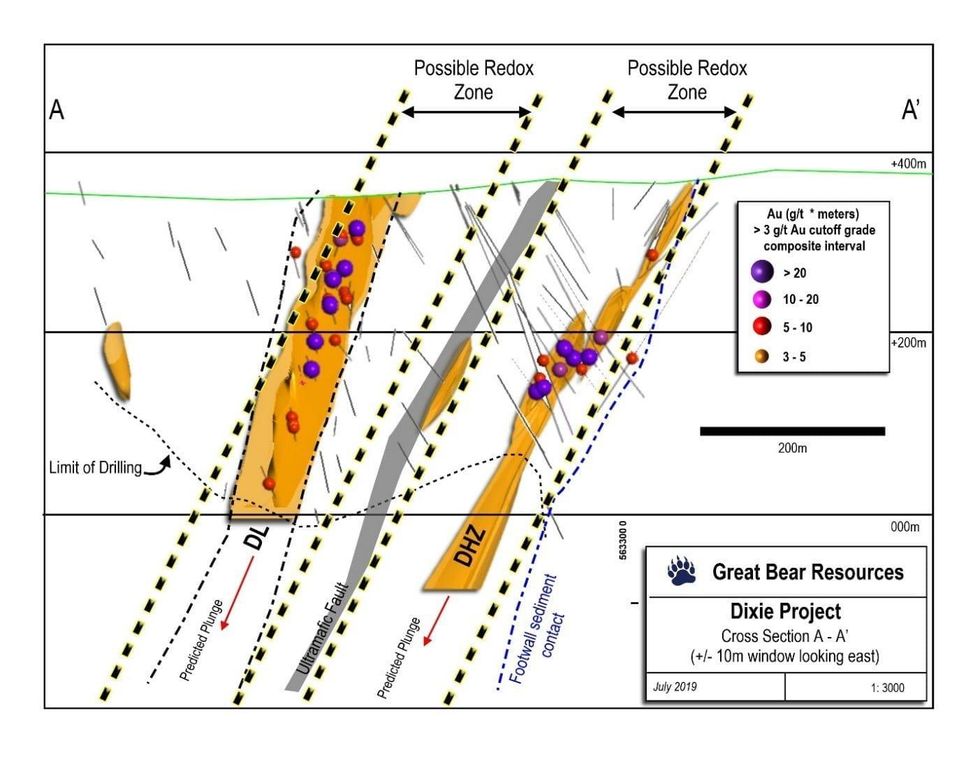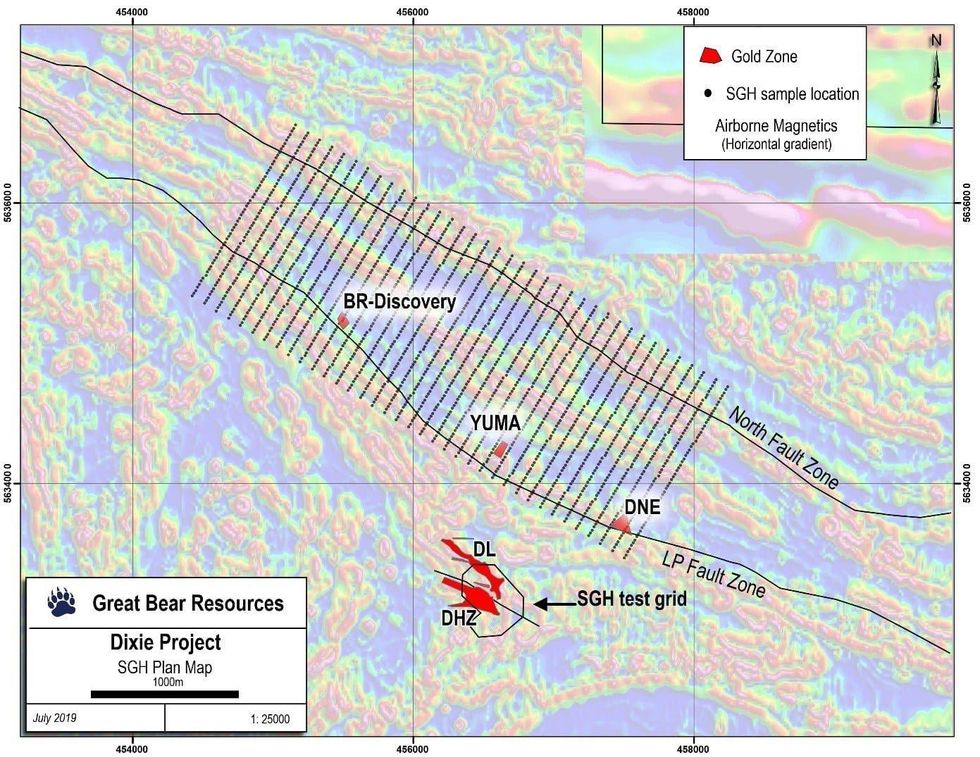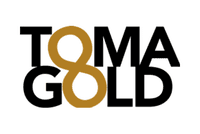Great Bear Explores the New “LP Fault” Gold-Bearing Structure with Three Drill Rigs and 2,100 Sample Geochemical Survey
Great Bear Resources Ltd. (the “Company” or “Great Bear”) (TSXV:GBR) today provided an update on ongoing exploration at its 100% owned Dixie property in the Red Lake district of Ontario.
Great Bear Resources Ltd. (the “Company” or “Great Bear”) (TSXV:GBR) today provided an update on ongoing exploration at its 100% owned Dixie property in the Red Lake district of Ontario.



The Dixie property contains four high-grade gold zones which extend to the near-surface, including two recently announced discoveries, the Bear-Rimini and Yuma Zones. The two new zones are hosted within, and adjacent to, a major crustal-scale deformation zone (see news releases of May 28 and July 16, 2019) called the “LP Fault”. This structure is a major interpreted gold mineralization control that traverses the Dixie claims along approximately 18 kilometres of strike length.
Highlights of current exploration activities include:
- All three drill rigs have now been deployed along the LP Fault.
- The Company tested a new geochemical survey technique – Spaciotemporal Geochemical Hydrocarbon (“SGH”) -that successfully located bedrock gold mineralization below glacial till cover in the Hinge and Dixie Limb areas.
- An extensive SGH survey consisting of 2,100 samples was subsequently completed over 4 kilometres of strike length of the LP Fault, as the area is also covered by thin till cover. Results are expected in 4 – 6 weeks.
- Drill results are pending from the Bear-Rimini, Yuma, Hinge, Dixie Limb and DNE target areas.
Chris Taylor, President and CEO of Great Bear said, “While the Hinge and Dixie Limb Zones continue to generate excellent high-grade gold results and will remain priority drill targets, early drilling of the LP Fault has also been very encouraging, and we plan to move all three of our drills to various targets along the structure as we await backlogged assays from the Hinge and Limb. The area of the LP Fault and North Fault that is prospective for gold mineralization covers a district-scale target of approximately 50 square kilometres that is simply too large to explore through drilling alone. The area’s bedrock is also 99% covered by a thin, 2 to 10 metre deep glacial till blanket, and hence cannot be directly mapped. Great Bear has now successfully tested a new geochemical method that is potentially capable of locating bedrock gold drill targets beneath the till cover, and could accelerate our exploration of this exciting new discovery.”
New Geochemical Survey Technique – SGH
In May 2019, Great Bear completed a 145 sample test/orientation SGH survey across its Hinge and Dixie Limb Zones. SGH survey details are provided at the end of this release.
Independent analysis of the SGH survey results provided by Activation Laboratories Ltd. successfully identified both areas of underlying bedrock gold mineralization at the Hinge and Dixie Limb, as shown on Figure 1. A cross section through both zones showing redox boundaries and associated gold mineralization as predicted by the SGH survey and interpreted by Great Bear is provided in Figure 2.
The Company subsequently collected over 2,100 SGH samples during June and July along 4 kilometres strike length, and 1 kilometre width of the LP Fault and North Fault. A map of the geochemical survey is provided in Figure 3. Results of the survey will be used to inform ongoing drilling, and will provide a cost-effective supplement to the concurrent drill program and existing high-resolution geophysical database.
Should the SGH method successfully predict bedrock gold mineralization along the LP and North Faults as it did at the Hinge and Dixie Limb, the survey will be expanded along more of the 18 kilometre strike length of the new targets.
Drill Program Update
The Company continues to undertake a fully funded, 90,000 metre drill program that is expected to continue through 2019 and 2020. Targets tested will include the Hinge Zone, Dixie Limb Zone, Bear-Rimini Zone, Yuma Zone, LP Fault, North Fault, DNE Zone and other targets across the property. In order to accelerate the program, a second drill rig was added in February, and a third drill rig arrived in June of 2019. Approximately 50,000 metres of drilling remain in the current program.
Great Bear has been aggressively drilling the LP Fault, including its associated Bear-Rimini, Yuma and DNE Zones, in tandem with ongoing drilling of the Hinge and Dixie Limb Zones since the Company’s discovery of high-grade gold at the Bear-Rimini Discovery area in May of 2019.
The Company is also continuing its program of re-logging, surveying and sampling of historical drill core, collecting lithogeochmical samples and completing petrographic analysis.
Results will continue to be provided as received and analysed.
About the SGH Survey
The following description of the SGH survey methodology was provided to Great Bear: “Actlabs’ Spatiotemporal Geochemical Hydrocarbon (SGH) analysis is designed to target mineralization under cover. SGH research since 1996 has shown that surficial material adsorbs hydrocarbon compounds released from the decomposition of bacteria and microbes that have fed on a mineral target at depth. Near surface samples (soil, sediment, peat, till, sand, etc.) are collected, the weakly-bound, heavy hydrocarbons in the C5-C17 carbon series range are desorbed at the laboratory, and over 160 of these compounds are analysed by Gas Chromatography/Mass Spectrometry (GC/MS). The unique mixture of compounds is like a fingerprint that provides a highly-confident, forensic, identification of the mineralization at depth. SGH is blind to the inorganic content of samples and thus does not reflect mobilized anomalies or any nugget effects. It is a cost-effective technique which can be used in tandem with geophysics to improve drill targeting success rate.”
About Great Bear
Great Bear Resources Ltd. (TSX-V: GBR) is a well-financed company based in Vancouver, Canada, managed by a team with a track record of success in the mineral exploration sector. Great Bear holds a 100% interest, royalty free, in its flagship Dixie property, which is road accessible year-round via Highway 105, a 15 minute drive from downtown Red Lake, Ontario. The Red Lake mining district is one of the premier mining districts in Canada, benefitting from major active mining operations including the Red Lake Gold Mine of Newmont Goldcorp Corp., plus modern infrastructure and a skilled workforce. Production from the Red Lake district does not necessarily reflect the mineralization that may, or may not be hosted on the Company’s Dixie property. The Dixie property covers a drill and geophysically defined multi kilometre gold mineralized structure similar to that associated with other producing gold mines in the district. In addition, Great Bear is also earning a 100% royalty-free interest in the Pakwash, Dedee and Sobel properties, which cover regionally significant gold-controlling structures and prospective geology. All of Great Bear’s Red Lake projects are accessible year-round through existing roads.
Drill core is logged and sampled in a secure core storage facility located in Red Lake Ontario. Core samples from the program are cut in half, using a diamond cutting saw, and are sent to SGS Canada Inc. in Red Lake, Ontario, and Activation Laboratories in Ancaster, Ontario, both of which are accredited mineral analysis laboratories, for analysis. All samples are analysed for gold using standard Fire Assay-AA techniques. Samples returning over 10.0 g/t gold are analysed utilizing standard Fire Assay-Gravimetric methods. Selected samples with visible gold are also analyzed with a standard 1 kg metallic screen fire assay. Certified gold reference standards, blanks and field duplicates are routinely inserted into the sample stream, as part of Great Bear’s quality control/quality assurance program (QAQC). No QAQC issues were noted with the results reported herein.
Mr. R. Bob Singh, P.Geo, Director and VP Exploration, and Ms. Andrea Diakow P.Geo, Exploration Manager for Great Bear are the Qualified Persons as defined by National Instrument 43-101 responsible for the accuracy of technical information contained in this news release.
ON BEHALF OF THE BOARD
“Chris Taylor”
Chris Taylor, President and CEO
Inquiries:
Tel: 604-646-8354
Fax: 604-646-4526
info@greatbearresources.ca
www.greatbearresources.ca
Neither TSX Venture Exchange nor its Regulation Services Provider (as that term is defined in the policies of the TSX Venture Exchange) accepts responsibility for the adequacy or accuracy of this release.
This new release may contain forward-looking statements. These statements are based on current expectations and assumptions that are subject to risks and uncertainties. Actual results could differ materially because of factors discussed in the management discussion and analysis section of our interim and most recent annual financial statement or other reports and filings with the TSX Venture Exchange and applicable Canadian securities regulations. We do not assume any obligation to update any forward-looking statements.
Click here to connect with Great Bear Resources (TSXV:GBR, OTC:GTBDF) for an Investor Presentation.
Source: www.newswire.ca





